GM Diet – 7 Day Diet Chart, Foods List, Benefits, & Risks
Pro tips and sample diet charts to execute this popular weight-loss diet plan perfectly.
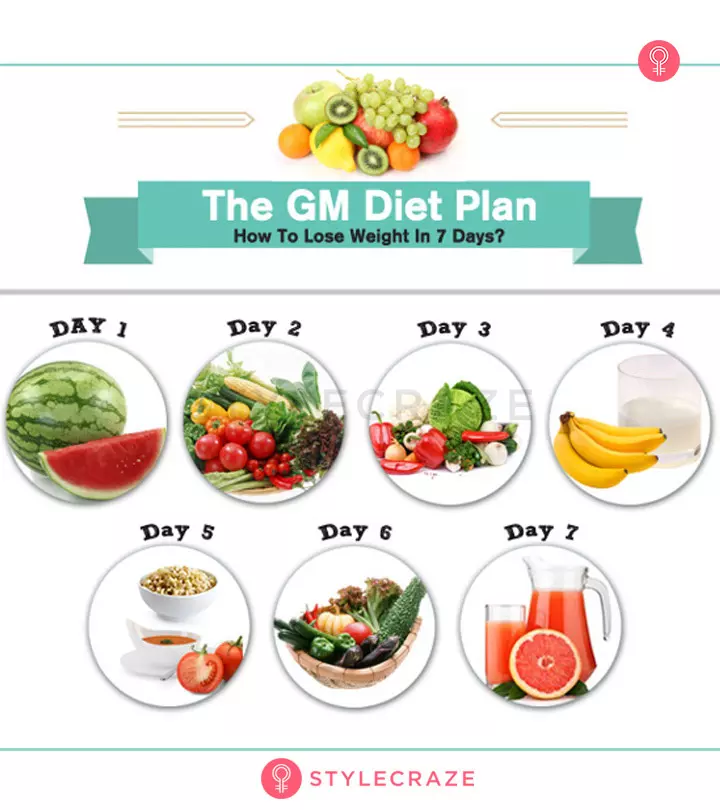
Image: StyleCraze
GM diet is a popular weight loss diet plan that claims to aid in quick weight loss. However, over the years, health professionals have expressed serious concerns about its potential health risks and sustainability. This is because the diet is extremely restrictive, making it unfit for long-term weight management.
The fad diet actually became popular after employees of General Motors tried it and lost a lot of weight in just a week. However, new studies suggest that losing weight quickly is not safe. Moreover, there is no scientific study supporting the GM diet. So, before you decide to be on this diet, take a closer look. Read on to know everything about the GM diet, what to eat for 7 days, how it may aid weight loss, and if it is safe. Swipe up!
 At A Glance: The GM Diet
At A Glance: The GM Diet- Principle: Low-calorie diet focusing on a specific food group each day for a week to help lose 6-7 kilograms.
- Purpose: To promote weight loss, boost metabolism, improve digestion, and detoxify the body
- Who Is It For: People with obesity
- Duration: Short-term
- Who Should Avoid: People with heart diseases and arthritis, and pregnant and lactating women.
- Cons: Not a scientifically proven diet plan, and may cause fatigue, muscle loss, nutrient deficiency, dehydration, irritability, and electrolyte imbalance.
In This Article
What Is The GM Diet?
The GM diet is a 7-Day diet plan for quick weight loss.
It was created in 1985 by General Motors to help its employees lose weight. The employees consumed low-calorie food groups on different days. By the end of the first week, the employees lost up to 17 lbs (7.7 kgs).
The employees consumed low-calorie food groups on different days. This is believed to have triggered the weight loss.
This made the GM diet a popular short-cut to losing weight. Does it really work? Find out next.
Key Takeaways
- The GM diet works by improving metabolism, including negative calorie foods, and enhancing digestion.
- This weight loss diet consists of lean protein sources, fresh fruits, and vegetables.
- However, this diet plan is not suitable for everyone and has several limitations, such as the risk of inadequate nutrition and rapid weight loss.
- It is not for people with diabetes.
Does The GM Diet Really Work? What Eleana Kaidanian, RD, Says
Eleana Kaidanian
, RD, CDN, CPT-WFS, says, “This is an extreme diet that, as a healthcare provider and registered dietitian, I would never recommend. It seems to be based on completely arbitrary restrictions beyond being significantly low-calorie with the goal of weight loss at any cost. The diet is also devoid of any protein for the first 4 days.”
She adds, “This diet is not sustainable and usually with an extremely restrictive diet you will see weight loss, but the weight will come back as no new habits or lasting dietary change was made. The one positive from the GM diet is that it encourages adequate hydration and is sourced appropriately from water.”
Going on a very low-calorie diet might work for weight loss. But these diets are not safe and are tough to follow. The proponents of the GM diet believe that it works based on the following factors:
- It Is Low In Calories: Weight loss is calculated by the number of calories you consume and the number of calories you burn. When you consume fewer calories, your body shifts to a negative energy balance. This makes you lose weight.
- It May Boost Metabolism: The foods included in this diet plan are believed to boost your metabolism and thus, help in fat burning. However, there is no study that backs this claim.
- It Includes Negative Calorie Foods: Negative calorie foods burn calories during their digestion and processing. This means you lose weight by burning calories even when you eat. It sounds good, but dietitians and nutritionists do not believe in the term “negative calorie foods”.
- It Is A Good Detox: Consuming healthy food and staying hydrated may help flush out toxins.
- May Improve Digestion: The fruits and vegetables in the GM diet contain dietary fiber, which helps improve bowel movement and digestion. However, it is not established if the GM diet follows the recommended 25 g dietary fiber/day based on a 2000-calorie diet (1) or not.
According to research, the proportion of adults in the United States following any kind of special diet has increased from 14.3% in 2007-2008 to 17.4% in 2017-2018. This shows that more people are turning to different dietary strategies to help them lose weight. Additionally, the proportion of adults following a low-calorie or weight-loss diet climbed from 7.5% in 2007-2008 to 10.0% in 2017-2018.
The GM diet was created to aid quick weight loss in employees of General Motors. Here’s what they were allowed to eat for a week:
GM Diet – Foods To Eat
This 7-day diet plan for weight loss is carefully curated to ensure you consume low-calorie foods that also keep your energy levels high.
Day 1
- Eat as many fruits as you like. Berries, watermelons, and cantaloupes are recommended.
- Stay away from bananas on Day 1.
- Drink 8 to 12 glasses of water during the day.
Day 2
- Consume only vegetables.
- Use olive oil for cooking (no deep frying) the vegetables.
- Drink 8 to 12 glasses of water.
Day 3
- Consume fruits and vegetables.
- Avoid potatoes and bananas.
- Drink 8 to 12 glasses of water.
Day 4
- Consume 8 (small) bananas and 4 glasses of milk (8 fluid ounces). Banana is a superfood that helps to replenish our energy levels. Choose skim milk and avoid adding sugar or sweeteners to milk.
- You may consume a bowl of clear vegetable soup if it gets too monotonous.
- Drink 8 to 12 glasses of water.
Day 5
- Have brown rice.
- Consume 6 large tomatoes.
- Those following the non-vegetarian version can consume chicken breast or fish.
- Those following the vegetarian version can consume tofu or cottage cheese.
- Keep yourself hydrated with water and/or strained fruit juices (without sugar or sweeteners).
*Increase water intake by two glasses to flush out extra uric acid (chemical product of the breakdown of purinesi One of the two chemical substances that cells use to create the building blocks of DNA and RNA. The body converts them into uric acid. , which are found in meat).
Day 6
- Consume brown rice.
- Non-vegetarians can consume chicken breast or fish.
- Consume raw or sautéed vegetables. Avoid potatoes.
- Keep yourself hydrated with water and/or strained fruit juices (without sugar or sweeteners).
Day 7
- Consume brown rice.
- Consume raw or sautéed veggies.
- Have 4 glasses of fruit juice.
- Drink 8 glasses of water.
Other Foods To Consume
- Green tea without sugar
- Black coffee without sugar or milk
Foods To Avoid
- Soda
- Alcohol
- Junk food
- Packaged/canned food
[Read – Slim Fast Diet]
The structured GM diet menu ensures that you consume the right combination of nutrients each day to maximize results. Here’s a sample diet chart that can help with your meal preparation.
Sample 7-Day GM Diet Plan
*1 cup = 250 grams or 8.8 ounces
The GM diet day 1–7 menu is designed to transition your body to healthier eating patterns progressively.
GM Diet Day 1
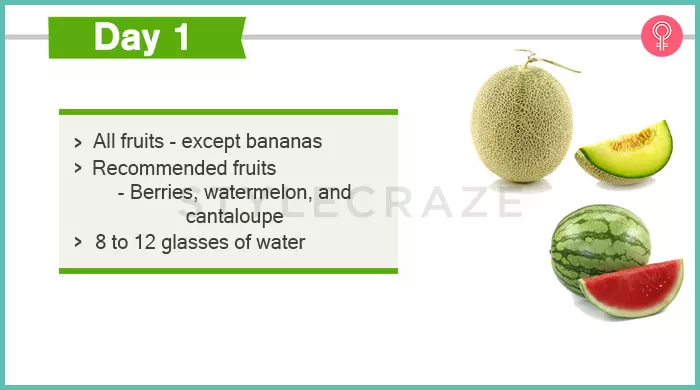
- Breakfast (8:00 a.m.) – A medium apple + a few berries + 1 glass of water
- Mid-Morning (10:30 a.m.) – ½ cup cantaloupe + 1 glass of water
- Lunch (12:30 p.m.) – 1 cup watermelon + 2 glasses of water
- Evening Snack (4:00 p.m.) – 1 large orange + 1 glass of water
- Dinner (6:30 p.m.) – 1 cup cantaloupe and berries + 1 glass of water
- Snack (8:30 p.m.) – ½ cup watermelon + 2 glasses of water
Foods To Avoid – Day 1
- Vegetables – All veggies
- Fruits – Banana
- Protein – Meat, eggs, fish, beans, lentils, and mushrooms.
- Fats & Oils – Lard, butter, margarine, and safflower oil.
- Carbs – Carb-rich foods, including brown rice.
- Dairy – Full-fat milk, full-fat yogurt, frozen yogurt, ice cream, and cheese.
- Beverages – Alcohol, soda, sweetened drinks, milkshakes, vegetable juices or smoothies, and packaged fruit juices.
GM Diet Day 2
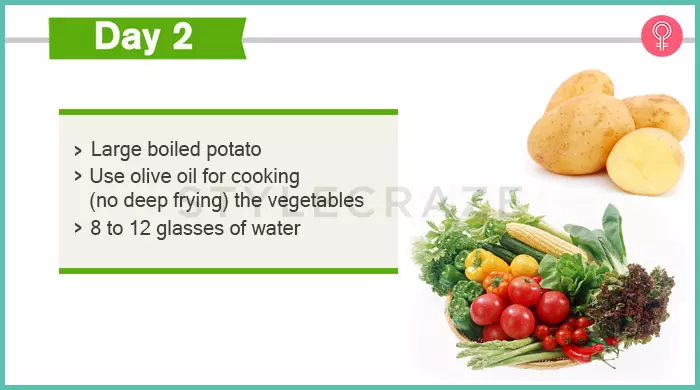
- Breakfast (8:00 a.m.) – 1 cup of boiled potato (with a little salt and pepper) + 1 glass of water
- Mid-Morning (10:30 a.m.) –½ cucumber + 1 glass of water
- Lunch (12:30 p.m.) – 1 cup of lettuce, bell peppers, baby spinach, and asparagus + 2 glasses of water
- Evening Snack (4:00 p.m.) – ½ cup of baby carrots (lime juice and a pinch of salt) + 1 glass of water
- Dinner (6:30 p.m.) – 1 cup of blanched broccoli and green beans + 1 glass of water
- Snack (8:30 p.m.) – 1 cucumber + 2 glasses of water
Foods To Avoid – Day 2
- Fruits – All fruits
- Protein – Meat, eggs, fish, beans, lentils, and mushrooms.
- Fats & Oils – Lard, butter, margarine, and safflower oil.
- Carbs –Carb-rich foods, including brown rice.
- Dairy – Full-fat milk, full-fat yogurt, frozen yogurt, ice cream, and cheese.
- Beverages – Alcohol, soda, sweetened drinks, fresh fruit juices or smoothies, and packaged fruit juices.
GM Diet Day 3
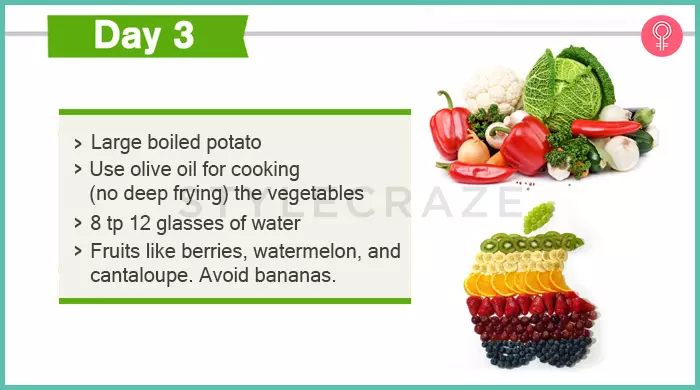
- Breakfast (8:00 a.m.) – ½ cup cantaloupe + 2 glasses of water
- Mid-Morning (10:30 a.m.) – 1 cup of pineapple or pear + 2 glasses of water
- Lunch (12:30 p.m.) – 1 cup of salad (cucumber, carrots, and lettuce) + 2 glasses of water
- Evening Snack (4:00 p.m.) – 1 orange + ½ cup of cantaloupe + 1 glass of water
- Dinner (6:30 p.m.) – 1 cup of salad (boiled broccoli + beets + spinach) + 2 glasses of water
- Snack (8:30 p.m.) – 1 pear + 1 glass of water
Foods To Avoid – Day 3
- Vegetables – Potato
- Fruits – Banana
- Protein – Meat, eggs, fish, beans, lentils, and mushrooms.
- Fats & Oils – Lard, butter, margarine, and safflower oil.
- Carbs –All carb-rich foods, including brown rice.
- Dairy – Full-fat milk, full-fat yogurt, frozen yogurt, ice cream, and cheese.
- Beverages – Alcohol, soda, sweetened drinks, vegetable smoothies or juices, and packaged fruit juices.
GM Diet Day 4
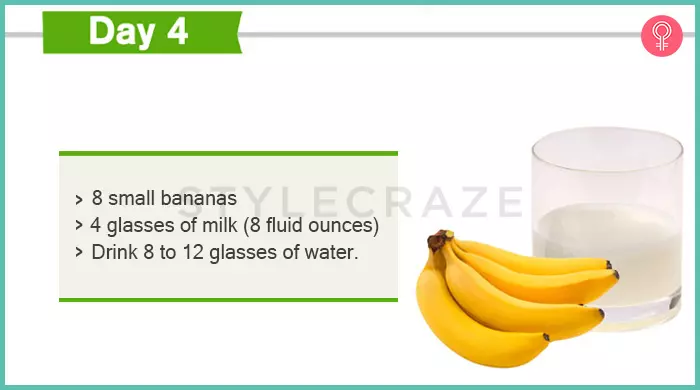
- Breakfast (8:00 a.m.) – 2 bananas + 1 glass of milk
- Mid-Morning (10:30 a.m.) – 1 banana + 1 glass of water or 1 glass of banana milkshake/smoothie
- Lunch (12:30 p.m.) – Milkshake (2 bananas + 1 glass of milk + a dash of cocoa powder) or 1 bowl of vegetable soup
- Evening Snack (4:00 p.m.) – 2 bananas
- Dinner (6:30 p.m.) – 1 banana + 1 glass of milk
- Snack (8:30 p.m.) – 1 glass of milk
Foods To Avoid – Day 4
All, except for bananas and milk.
GM Diet Day 5
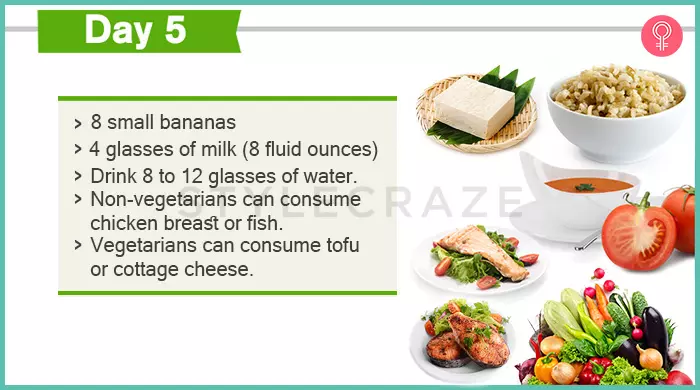
- Breakfast (9:00 a.m.) – 3 tomatoes + ½ cup sprouts + 2 glasses of water
Mid-morning (10:30 a.m.) – 1 apple + 1 glass of water - Lunch (12:30 p.m.) – ½ cup brown rice + sautéed assorted veggies/3 oz fish filet + 2 glasses of water
- Evening Snack (4:00 p.m.) – 2 tomatoes + 1 glass of water
- Dinner (6:30 p.m.) – 1 cup brown rice + 1 tomato + ½ cup of sautéed veggies + 2 glasses of water
Foods To Avoid – Day 5
- Vegetables – Potato and sweet potato.
- Fruits – Banana
- Protein – Beef, pork, and turkey.
- Fats & Oils – Lard, butter, margarine, and safflower oil.
- Carbs – White rice, bread, and processed foods.
- Dairy – Full-fat milk, full-fat yogurt, frozen yogurt, ice cream, and cheese.
- Beverages – Alcohol, soda, sweetened drinks, and packaged fruit juices.
GM Diet Day 6
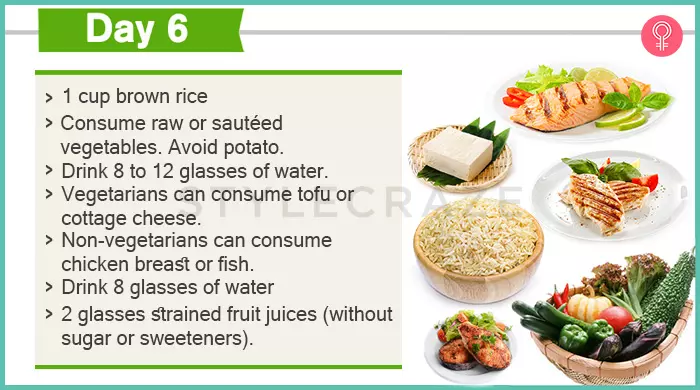
- Breakfast (9:00 a.m.) – 1 glass carrot juice + ½ cup boiled legumes
- Mid-morning (10:30 a.m.) – 1 cup of boiled vegetables + 2 glasses of water
- Lunch (12:00 p.m.) – ½ cup brown rice + ½ cup of veggies + Tofu/fish filet
- Snack (3:30 p.m.) – 1 cup cucumber slices + 2 glasses of water
- Dinner (6:30 p.m.) – ½ cup brown rice + ½ cup veggies + Chicken/cottage cheese + 2 glasses of water
Foods To Avoid – Day 6
- Vegetables– Sweet potato and potato.
- Fruits – All
- Protein– Beef, pork, and turkey.
- Fats & Oils – Lard, butter, margarine, and safflower oil.
- Carbs – White rice, bread, and processed foods.
- Dairy – Full-fat milk, full-fat yogurt, frozen yogurt, ice cream, and cheese.
- Beverages – Alcohol, soda, sweetened drinks, and packaged fruit juices.
GM Diet Day 7
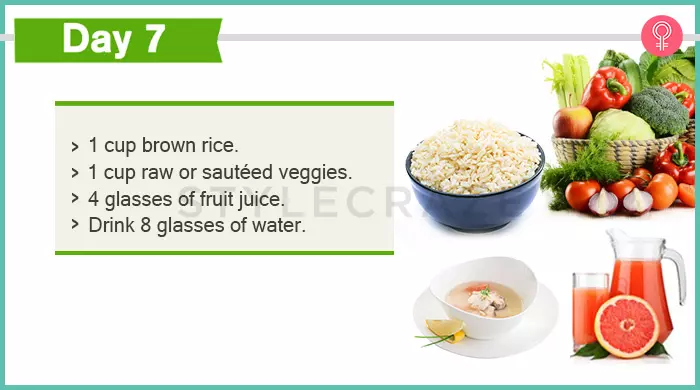
- Breakfast (9:00 a.m.) – 1 glass of orange/apple juice
- Mid Morning (10:30a.m.) – 1 cup fruit salad + 2 glasses of water
- Lunch (12:00 p.m.) – ½ cup brown rice + ½ cup sautéed veggies + 2 glasses of water
- Snack (3:30 p.m.) – 1 cup watermelon/few assorted berries + 2 glasses of water
- Dinner (6:30 p.m.) – 1 cup GM Soup + 2 glasses of water
Foods To Avoid – Day 7
- Vegetables – Potato and sweet potato.
- Fruits – Banana, cherry, mango, and pear.
- Protein – Avoid any kind of meat, such as beef, turkey, chicken, pork, fish, lentils, beans, soy, and mushrooms.
- Fats & Oils – Lard, butter, margarine, and safflower oil.
- Carbs – White rice, bread, and processed foods.
- Dairy – Full-fat milk, full-fat yogurt, frozen yogurt, ice cream, and cheese.
- Beverages – Alcohol, soda, sweetened drinks, and packaged fruit juices.
Here’s a full view of this diet chart. Save it. Use it whenever you need it! You can also create a personalized weight loss diet plan inspired by the GM diet, which can make it easier to adapt the principles to your specific health and nutritional needs.
GM Diet Chart For Weight Loss
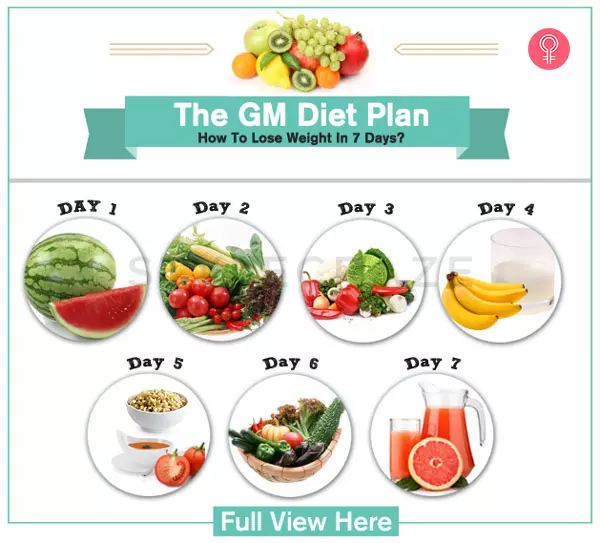
If you are wondering what e GM diet soup is, we have the recipe below.
GM Diet Soup Recipe
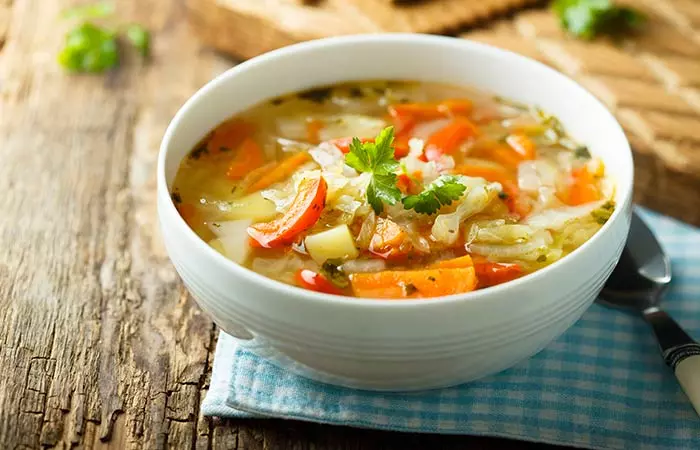
Calorie – 899 (150 calories per serving); Serves – 6; Prep Time – 15 mins; Cooking Time – 30-40 mins
Ingredients
- 6 large onions, chopped
- 3 tomatoes, chopped
- 1 cabbage (100 grams), sliced
- 2 carrots (122 grams), sliced
- 3-4 stalks of celery, chopped
- Water as needed
- Salt to taste
- ½ teaspoon black pepper
- 2 lime wedges
- 3 tablespoons olive oil
- A handful of chopped parsley for garnish
How To Prepare
- Toss the chopped onion and celery in a pot and sauté them in olive oil for 2-3 minutes.
- Add the chopped carrot.
- Add water and salt.
- Cover the lid and cook on medium heat for 30-35 minutes.
- Sprinkle black pepper, squeeze in lime juice, and stir well.
- Garnish with chopped parsley and serve.
Following any diet plan requires consistency and effort. Moreover, making healthy lifestyle changes can increase the chances of success, help you feel better, and stay healthy.
Tips For Success
You can maximize your chances of success on the GM diet by following these tips:
- Remember to stay hydrated and drink adequate water.
- Plan your meals in advance to avoid impulsive eating, which might hinder your progress.
- Manage hunger pangs with healthy snacks or beverages.
- Listen to your body and consult with a healthcare professional if you experience any adverse effects.
- Once you have completed the diet, gradually transition to a balanced diet rich in fruits, vegetables, whole grains, and lean protein.
- Incorporate regular exercise into your routine. This helps boost your metabolism and support weight loss.
- Practice stress-management techniques like yoga or meditation to avoid emotional eating.
Remember, sustainable weight loss takes time and effort. Avoid unrealistic expectations and focus on making gradual, healthy changes. Before you start stirring the pot, check out the benefits and side effects of the GM diet to make an informed decision.
GM Diet Benefits
The benefits of the GM diet are not backed by evidence, but certain scientific facts pertaining to the foods included in this diet hold true:
- May Detoxify– Fruits and vegetables are loaded with antioxidants that help flush out toxins. A study published in the journal Nutrition found that consuming a diet rich in fruits and vegetables, particularly those rich in polyphenols and anthocyanins, can significantly contribute to reducing free radical damage. These free radicals can contribute to aging and various health problems, and antioxidants protect cells from damage caused by them (2).
- May Improve Health – Veggies and fruits boost immunity and improve cell functions (3), (4).
- May Prevent Weight Gain – Sugar-sweetened beverages (SSBs), such as soda, juice, and energy drinks, have been linked to significant weight gain, particularly in children and adolescents. Research published in the Obesity Facts journal suggests that consuming these beverages regularly can increase the risk of obesity and related health problems. Cutting back on sugar and sugary foods helps prevent weight gain (5), (6).
- May Help You Achieve Glowing Skin
The GM diet incorporates a variety of fruits and vegetables into your daily meals. This makes it a delightful and nutritious way to nurture your skin’s radiance.
Fruits rich in vitamin C, such as orange, aid in collagen production, promote skin elasticity, and reduce wrinkles (7). Leafy greens such as spinach and kale supply nutrients and antioxidants that guard against oxidative damage (8). Further, the beta-carotene found in carrots, tomatoes, and sweet potatoes enhances the skin’s natural sun protection (9).
These are some of the foods in this diet that are packed with essential nutrients and contribute to a clearer, more vibrant complexion.
 Quick Tip
Quick TipHowever, there are possible side effects or risks associated with the GM diet.
While the GM diet promises rapid weight loss, it is important to understand that this is often due to water weight loss rather than fat loss. The highly restrictive nature of this diet can lead to nutritional deficiencies, muscle loss, and other health issues.
Additionally, individual results may vary. What works for others may not work for you. Moreover, the rapid weight loss achieved through the GM diet is often temporary, and people tend to regain weight once they resume normal eating habits. Keep reading to learn more about the risks of losing weight by following this diet.
GM Diet Risks And Side Effects
When diving into the GM Diet, it is crucial to be aware that while it promises quick results, it might come with some bumps along the way. As with any strict diet plan, the GM diet side effects can sneak up on you. To make sure you’re fully informed, it is a good idea to check out what potential risks and side effects could be on the horizon.
- There Is No Scientific Backing – The GM diet is not backed by any scientific study.
- Dehydration – The GM diet accounts for very low fluid intake, which may cause dehydration and lead to symptoms like headache, dizziness, and fatigue.
- No Long-Term Weight Loss – The GM diet is a fad diet and is not recommended for long-term weight loss goals. Also, there is a possibility of regaining the lost weight once you stop this restrictive diet.
- Lacks Nutrients – Limited access to foods makes the GM diet lacking in nutrients like vitamin B12, calcium, and iron. This can lead to nutrient deficiencies and symptoms like fatigue and brittle nails.
- Muscle Loss – Low-calorie diets, more often than not, cause muscle loss. This can ultimately cause slow metabolism, which can make it difficult to maintain weight loss in the future (10), (11). The muscle tissues are deprived of an adequate amount of proteins, which may also lead to physical weakness.
- Electrolyte Imbalance – The large intake of fruits and vegetables in this diet may result in a diuretic effect. This, in turn, leads to an increase in urination.
- Mood Swings – The GM diet restrictions may cause mood swings and irritability.
- Tiredness And Fatigue – A sudden dip in calorie intake might make you feel tired and weak.
Kavita Deo, a blogger, recounted her experience of trying the GM diet for one week in her blog. She said, “I lost 500 grams of fat and only 800 grams of weight. This result was nowhere near my previous attempts, where I had lost 2 to 3 kilos in weight and around 1 kilo of fat. This wasn’t bad, but not good either (i).”
 Quick Tip
Quick TipSeverely restricting calories and following the GM diet without professional supervision can lead to an increase in the risk of various health complications. So, always consult with a healthcare professional or a registered dietitian before starting any extreme diet, especially if you have pre-existing health conditions.
If you would still like to follow this diet, it is important to do it in a healthy manner. Check out the next section to learn how to do so.
How To Safely Follow The GM Diet Plan
- If you have any health issues, consult your physician or nutritionist before starting any restrictive diet.
- Follow the prescribed diet plan and avoid skipping meals to maintain nutrient balance.
- Avoid sugary beverages and alcohol to prevent excess calorie consumption.
- Include a variety of foods from all major food groups in your diet for balanced nutrition.
- Drink 8 to 10 glasses of water every day to stay hydrated.
- Incorporate some physical activity in your daily routine to support weight loss and overall well-being.
Now that you know both sides of the coin, should you really try the GM Diet to lose weight?
Should You Go On The GM Diet To Lose Weight?
Losing weight is tough. It takes time, patience, determination, and healthy eating. Quick weight loss or a shortcut like the GM diet may fix a temporary problem, but it is not suitable for long-term weight loss. You must follow a healthy lifestyle, exercise, get 7-8 hours of sleep, and meditate to keep the excess flab away in the long run. Pursuing a meal plan that is not backed by science, doctors, nutritionists, and dietitians is not worth risking your health and well-being.
While this seven day diet may help you lose weight soon, it is quite restrictive and low in calories. If you are looking for healthier diets to follow, check out the next section!
Alternatives To The GM Diet
There are numerous well-balanced diets you may try instead of the GM. For example, the Mediterranean diet focuses on whole grains, healthy fats, fruits, vegetables, lean proteins, and moderate dairy. The diet may support heart health, reduce inflammation, and lead to steady, long-term weight loss (12). Another great option is the DASH diet. It includes a reduced sodium intake and eating nutrient-rich foods like fruits, vegetables, and whole grains. It may help lower blood pressure, promote heart health, and support weight management (13).
Infographic: Nutrient-Dense Low-Calorie Foods To Eat On The GM Diet
The GM diet can lead to nutritional deficiencies, which could be a concern for those who would like to try it out. The results are impressive and help you achieve your fitness goals but such a diet is not healthy in the long term. Dietary inclusion of foods that boost immunity and health while having fewer calories is important.
Check out the infographic below to learn about the most nutritious foods you should have while on the GM diet. Illustration: StyleCraze Design Team
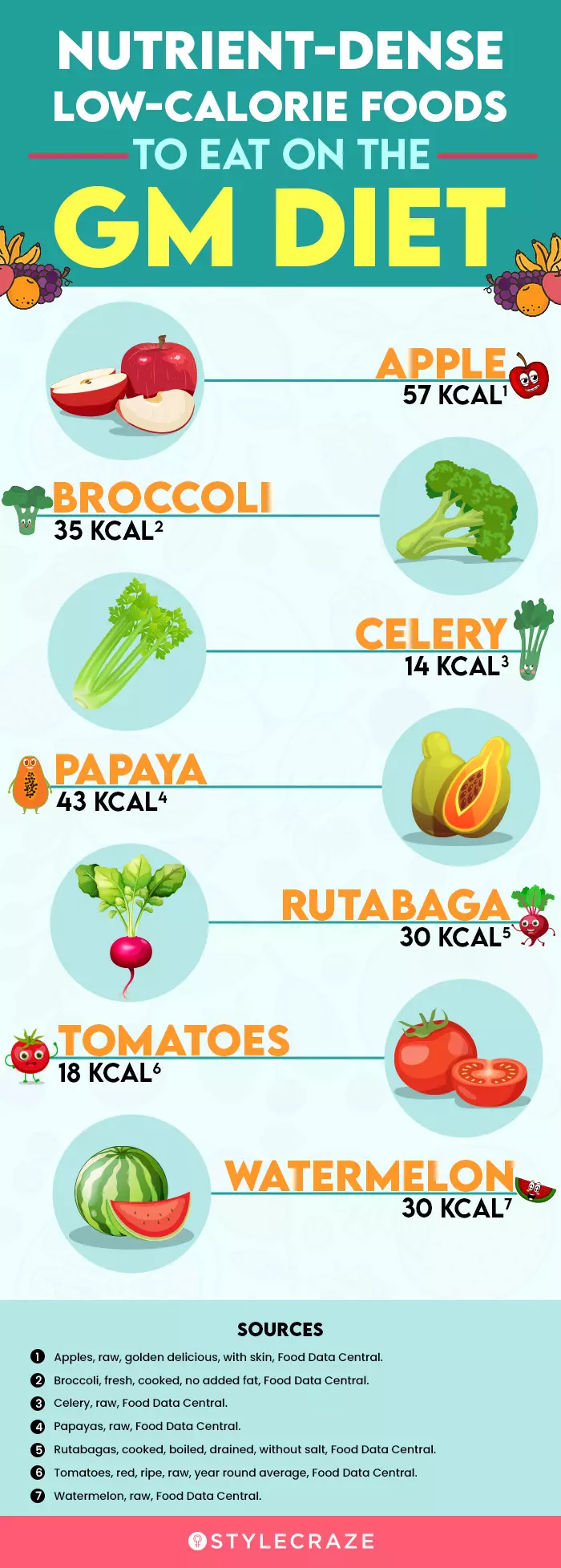
The GM diet plan is a week-long low-calorie diet strategy, which is found to be effective in losing weight rapidly and improving fitness levels. This 7-day meal plan restricts calories and certain food groups. However, it is considered a fad diet and is not backed by dieticians and researchers, given the lack of scientific evidence. The vegetarian diet mostly comprises fruits and vegetables, while certain non-vegetarian foods are allowed only on the fifth and sixth day of the diet. So, people may miss out on certain nutrients essential for the body, lose muscle mass, and become weak and tired. Hence, it is not ideal for long-term weight loss. So, it is advised to consult a doctor/dietitian to get a well-designed, customized, balanced diet plan for shedding the flab in a healthy way.
Frequently Asked Questions
How safe is the GM diet for diabetics?
Blanca Garcia, Registered Dietitian Nutritionist, says, “Due to the significant decrease in calories, the GM diet is not recommended for diabetics. It can create an imbalance of carbohydrates essential to the blood glucose balance.”
How do I maintain my weight loss after a GM diet?
According to Garcia, “Unfortunately, after ending a GM diet cycle, you are likely to gain the weight back. That is because you’ve had to do such a drastic decrease in calories that the moment you start to eat normally, the weight will naturally come back.”
She adds, “The best way to lose weight is to slowly lose weight with small changes over time. You are more likely to keep off weight that has taken time for you to get used to rather than extreme changes that change frequently.”
How much weight can you lose with the GM diet?
You can lose up to 17 lbs (7.7 kgs) with the GM diet.
Does the GM diet help reduce belly fat?
The GM diet aids overall weight loss. You will also see a significant reduction in your belly fat.
What is the GM diet soup?
The GM diet soup is a simple, clear soup made of cabbage, tomatoes, carrots, and celery. It is low in calories, tastes good, and can be prepared quickly.
Why am I not losing weight on the GM diet?
Weight loss depends on a number of factors – genes, current weight, muscle mass, and how long you have been on the GM diet. Sustaining the GM diet is challenging. If you give in to cravings while on the diet, you may not see any results. Also, do not be on the GM diet continuously. It can slow down your metabolism and prevent you from losing weight.
What is a good substitute for tomatoes in the GM diet?
You may use butternut squash instead of tomatoes.
Can I consume salt while on the GM diet?
Yes, you must consume salt while on the GM diet. Since you will be consuming a lot of fluid, consuming salt, especially sea salt, is essential to prevent electrolyte imbalancei It occurs when the level of electrolytes and minerals dissolved in bodily fluids like blood and urine is either too high or too low. . However, do not consume too much of it. Consume normal amounts in food. Add a pinch of salt to water or fruit juices.
Can I eat eggs while on the GM diet?
Yes, you can eat boiled eggs instead of meat while on the GM diet.
Is curd allowed in a GM diet?
Yes, you can include regular or soy curd on day 5 of your GM diet to improve digestion and shed those pounds easily.
Can we replace milk in the GM diet?
Yes, you can replace full-fat dairy milk with low-fat, skim milk. If you are looking for other options, you can opt for plant-based milk like that of soy, oat, or almond.
Illustration: 7 Day GM Diet Plan For Weight Loss
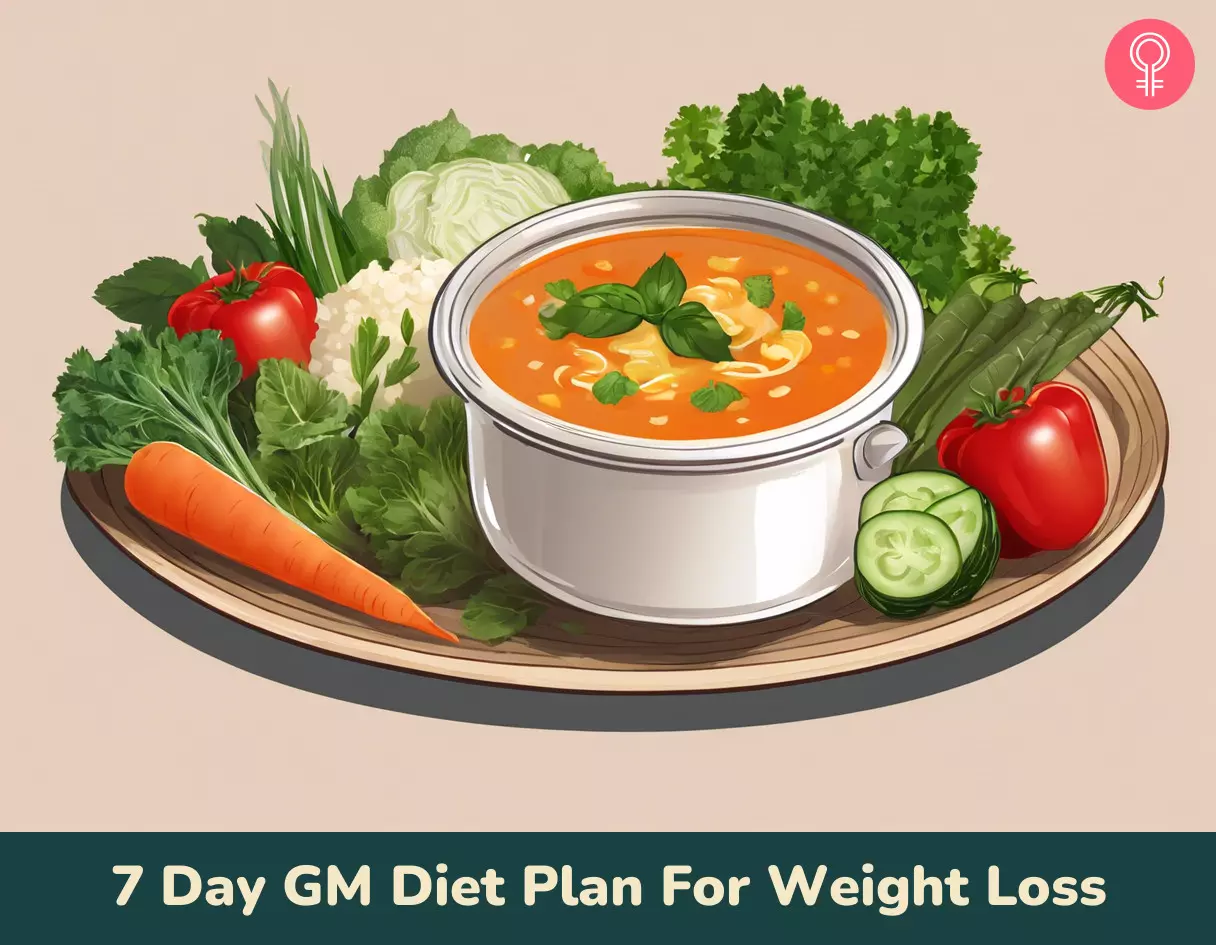
Image: Stable Diffusion/StyleCraze Design Team
References
Articles on StyleCraze are backed by verified information from peer-reviewed and academic research papers, reputed organizations, research institutions, and medical associations to ensure accuracy and relevance. Read our editorial policy to learn more.
- Dietary fibre and human health
https://www.researchgate.net/publication/235978852_Dietary_fibre_and_human_health - “Effect of fruit and vegetable antioxidants on total antioxidant capacity of blood plasma.” Nutrition, National Institutes of Health.
https://pubmed.ncbi.nlm.nih.gov/24698344/ - “Health-Promoting Components of Fruits and Vegetables in the Diet” Advances in Nutrition, National Institutes of Health.
https://www.ncbi.nlm.nih.gov/pmc/articles/PMC3650511/ - “Modulation of Immune Functions by Foods” Evidence-based Complementary and Alternative Medicine : eCAM, National Institutes of Health.
https://www.ncbi.nlm.nih.gov/pmc/articles/PMC538513/ - “Sugar-Sweetened Beverages and Weight Gain in Children and Adults: A Systematic Review from 2013 to 2015 and a Comparison with Previous Studies.” Obesity Facts, National Institute of Health.
https://pubmed.ncbi.nlm.nih.gov/29237159/ - “Effects of sugar intake on body weight: a review.” Obesity Reviews: An official journal of the International Association for the Study of Obesity, National Institutes of Health.
https://pubmed.ncbi.nlm.nih.gov/12760444/ - “Effects of oral intake fruit or fruit extract on skin aging in healthy adults: a systematic review and Meta-analysis of randomized controlled trials” Frontiers in Nutrition, National Institutes of Health.
https://www.ncbi.nlm.nih.gov/pmc/articles/PMC10436291/ - “Enhancement of Antioxidant Quality of Green Leafy Vegetables upon Different Cooking Method” Preventive Nutrition and Food Science, National Institutes of Health.
https://www.ncbi.nlm.nih.gov/pmc/articles/PMC5642804/ - “Do We Utilize Our Knowledge of the Skin Protective Effects of Carotenoids Enough?” Antioxidants, National Institutes of Health.
https://www.ncbi.nlm.nih.gov/pmc/articles/PMC6719967/ - “Effects of Weight Loss on Lean Mass, Strength, Bone, and Aerobic Capacity” Medicine and Science in Sports and Exercise, National Institutes of Health.
https://www.ncbi.nlm.nih.gov/pmc/articles/PMC5161655/ - “Metabolic Slowing with Massive Weight Loss despite Preservation of Fat-Free Mass” The Journal of Clinical Endocrinology and Metabolism, National Institutes of Health.
https://www.ncbi.nlm.nih.gov/pmc/articles/PMC3387402/ - “The Mediterranean Diet: An Update of the Clinical Trials” MDPI, National Institutes of Health.
https://www.ncbi.nlm.nih.gov/pmc/articles/PMC9317652/ - “DASH Diet To Stop Hypertension,” National Institutes of Health.
https://www.ncbi.nlm.nih.gov/books/NBK482514/
Read full bio of Merlin Annie Raj
- Blanca Garcia, RDN, has 8 years of experience as a nutrition specialist. She graduated from California State University of Los Angeles in 2011 and interned at the University of Puerto Rico Medical Science Campus in 2012. She services clients in both English and Spanish.
 Blanca Garcia, RDN, has 8 years of experience as a nutrition specialist. She graduated from California State University of Los Angeles in 2011 and interned at the University of Puerto Rico Medical Science Campus in 2012. She services clients in both English and Spanish.
Blanca Garcia, RDN, has 8 years of experience as a nutrition specialist. She graduated from California State University of Los Angeles in 2011 and interned at the University of Puerto Rico Medical Science Campus in 2012. She services clients in both English and Spanish.
Read full bio of Ravi Teja Tadimalla
Read full bio of Sindhu Koganti






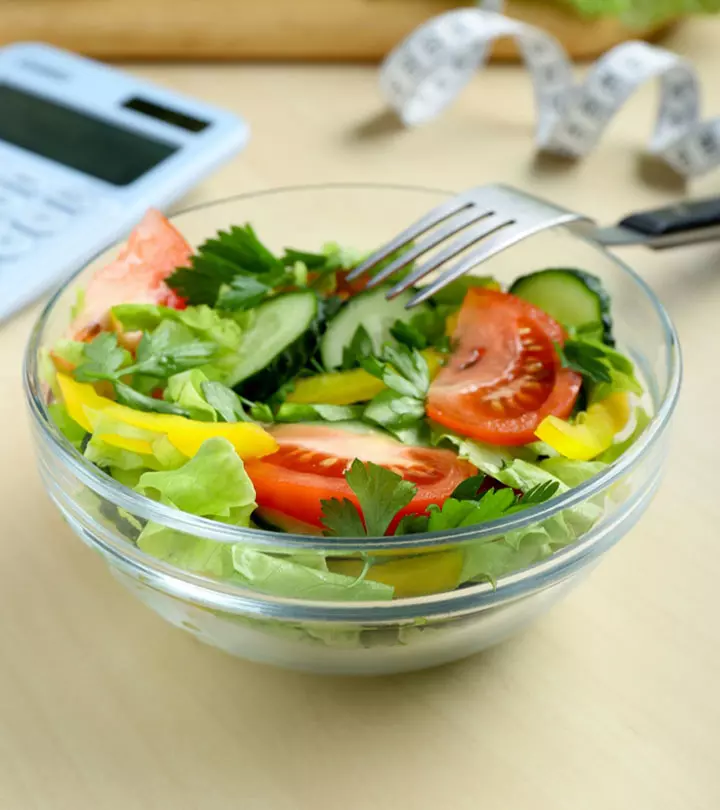

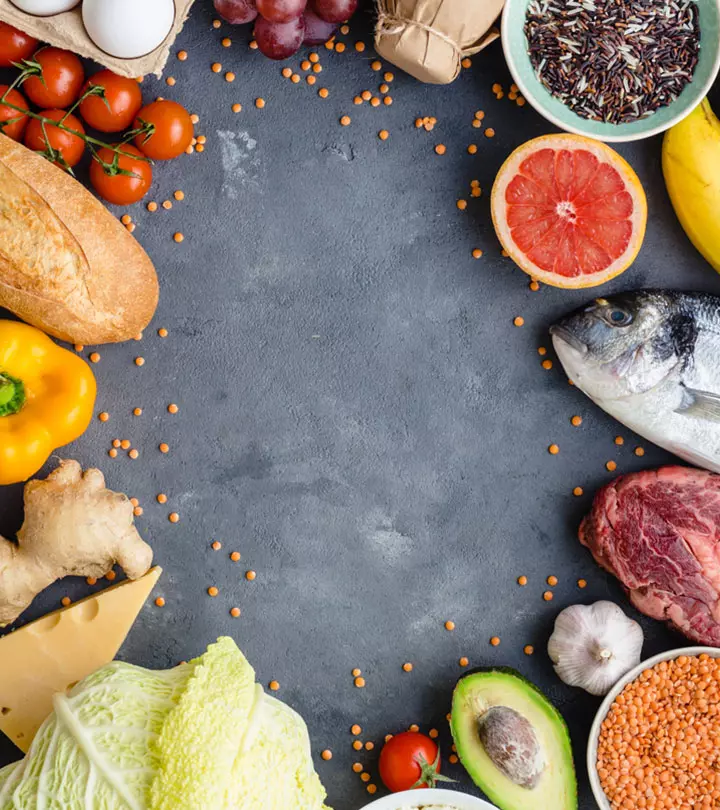

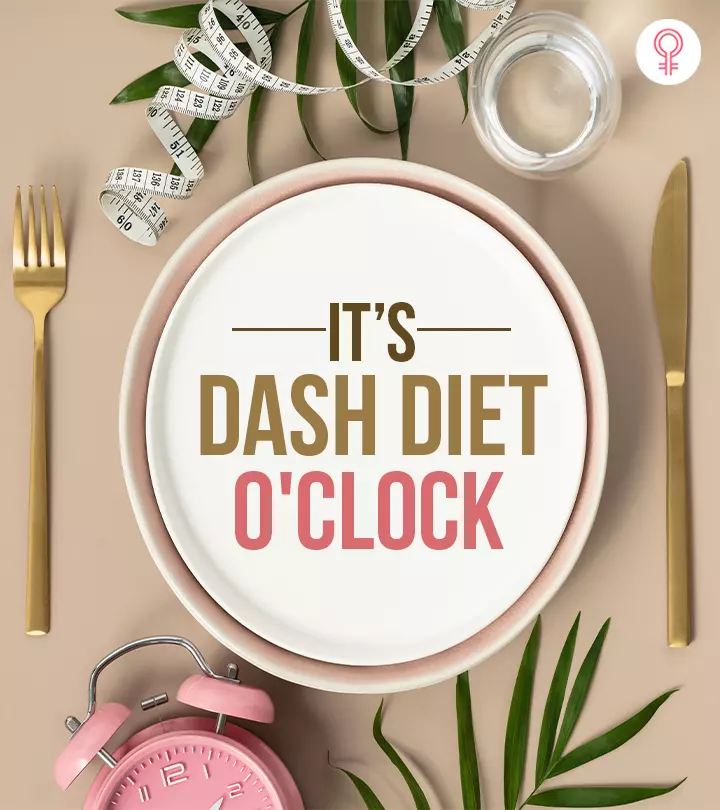
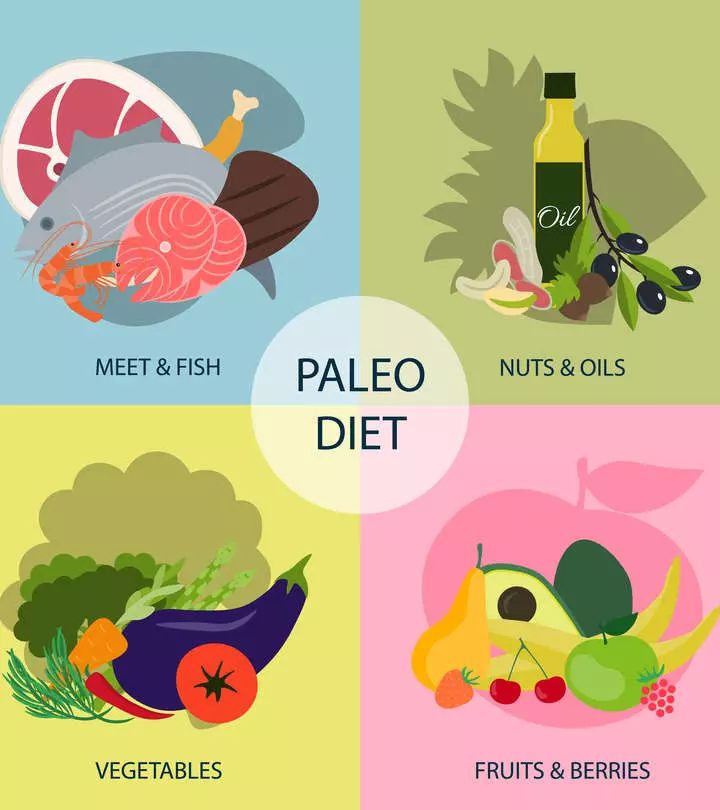



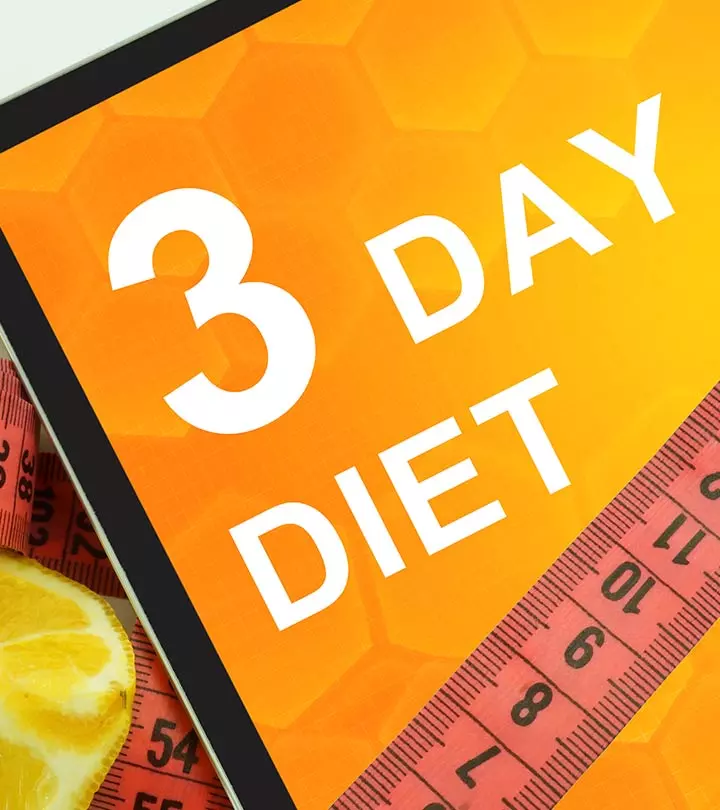
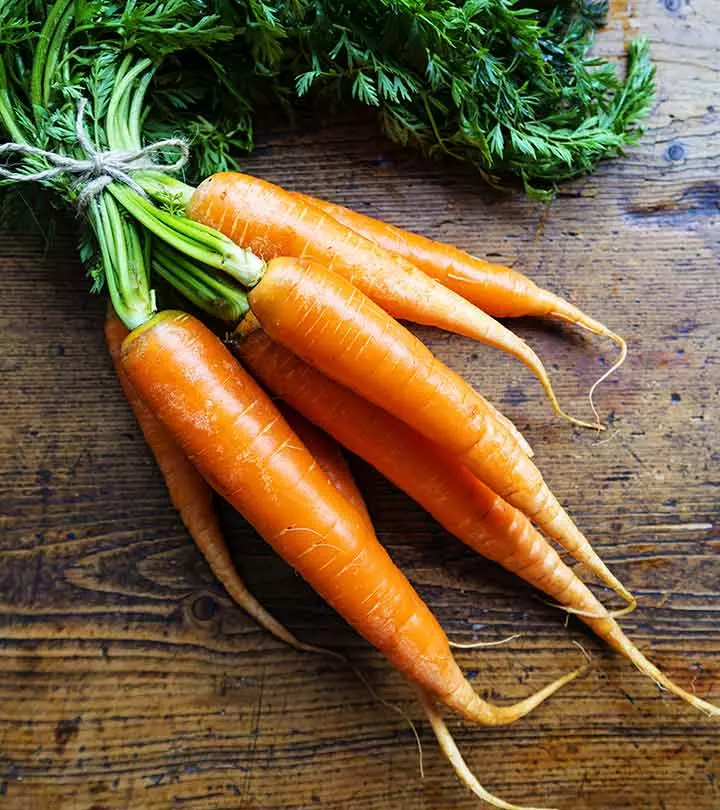


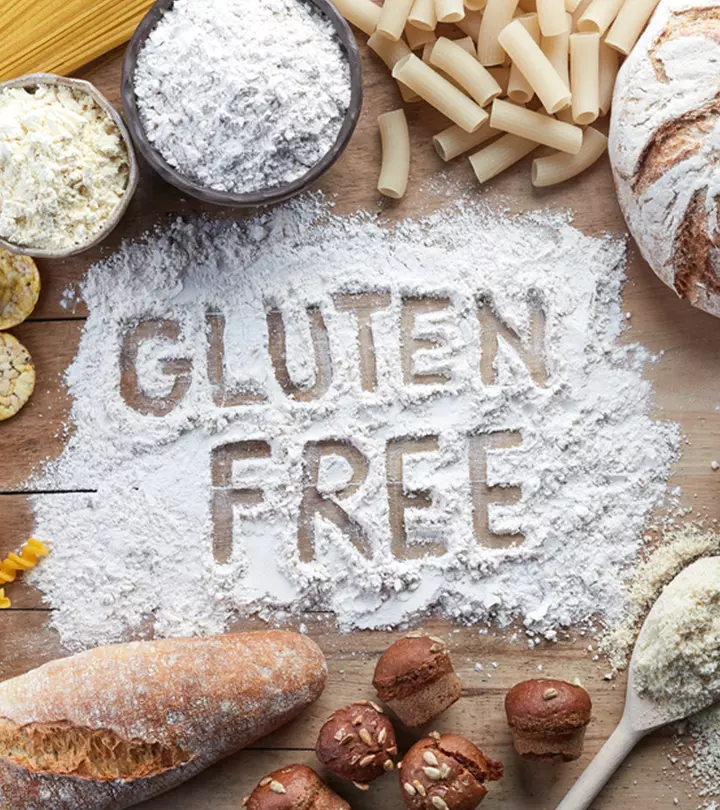


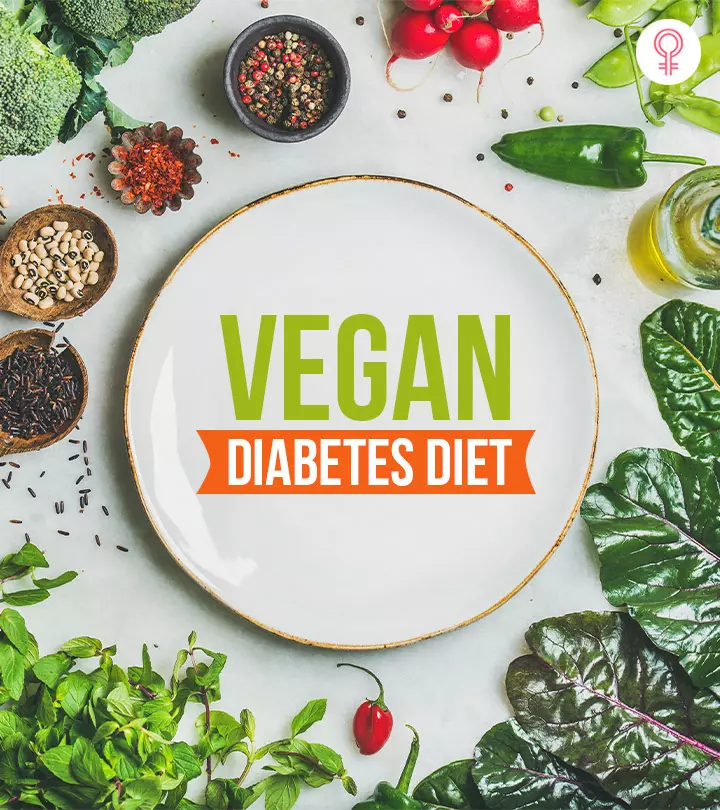

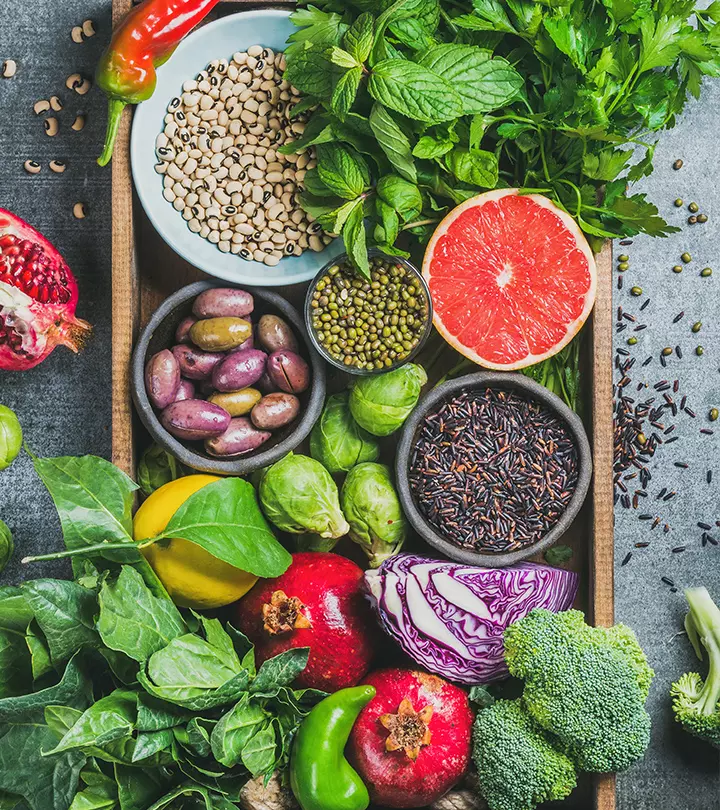
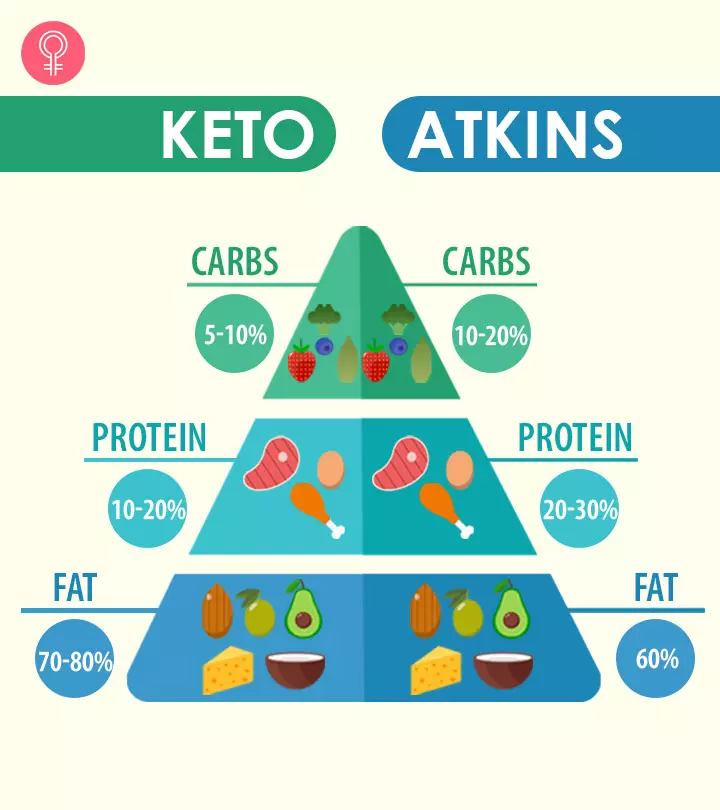

Community Experiences
Join the conversation and become a part of our empowering community! Share your stories, experiences, and insights to connect with other beauty, lifestyle, and health enthusiasts.